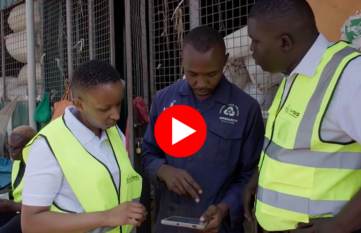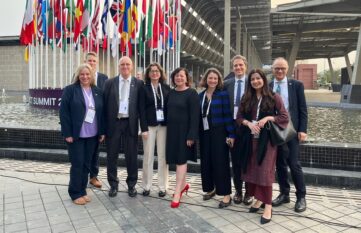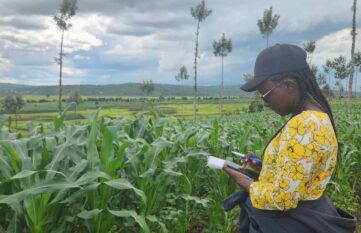From waiting weeks to instant answers: How AI is transforming farming advice

For many years, smallholder farmers have struggled to access reliable advice for their farms. Local extension officers, who are meant to advise farmers, are often stretched thin. In many regions, one extension worker serves up to 5,000 farmers, leaving countless questions unanswered. Visits are rare, and when they do happen, the advice can come too late. Human advisors also come with high costs of up to $35 per visit. Millions of smallholder farmers in India, Kenya and beyond face the same challenge: farming without timely, trustworthy information.
That’s where the Agriculture Information Exchange Platform (AIEP) stepped in. AIEP, funded by the Gates Foundation and coordinated by the BMZ-Initiative FAIR Forward set out to answer a simple but urgent question:
What if every farmer, no matter how remote, could get personalised, real-time advice in their own language—at little or no cost?
Over the past two years, AIEP has grown into a digital lifeline for more than 40,000 farmers in Kenya and Bihar, India. Instead of waiting weeks for answers, farmers can now open an app, call an interactive voice line, or chat on WhatsApp or Telegram to instantly receive guidance tailored to their crops, soil, and language.

© GIZ
Answers are instant. The answer that they provide is always with regards to the question that I have asked, and so far by using their advice I have seen improvement on my crop production. This shows that their information is reliable.
Female farmer, 49, about AIEP
Inclusive design and partner solutions
AIEP was designed with farmers at the centre, especially women, marginalised groups, and those with low literacy or limited digital skills. Instead of one-size-fits-all tools, the project has developed Minimum Viable Products (MVPs), meaning simplified versions tested with users before scaling up. By using AI optimised on local knowledge, the platform delivers advice through multiple channels—apps, voice calls, and chatbots—at lower cost. Farmers can ask follow-up questions, get responses in their own dialects, and even share what they’ve learned with neighbours.
The open-source platform approach and collaborative model ensures the solutions remain adaptable, transparent, and available. Each solution has been developed by a cohort of partner organisations and emphasises inclusivity, trust-building, and an omnichannel approach to maximise impact and accessibility.
I receive information through both messages and voice input. When I send a message, I get an instant response. There’s no need to go anywhere, I can access the information right from home.
Smallholder farmer, 33, about AIEP
Measuring impact and mext steps
The potential impact looks promising. In early 2025, 60decibels researchers surveyed 800 farmers and 20 extension workers using AIEP tools. Results showed an average Net Promoter Score of 60 measuring end user satisfaction—much higher than benchmarks of comparable digital farmer services in both Kenya and Bihar. Women farmers, often the most excluded, reported even higher satisfaction than men.
Still, there’s room to grow. Some farmers pointed out that while the advice was helpful, they lacked access to the inputs needed to act on it. Others wished for market price information to help them sell crops more profitably. These insights are guiding the next stage of development.
Smallholder farmers use our platform to get information about problems they are facing, to upskill, to plan and help and interact with other farmers.
Vineet Singh, Digital Green, Partner of AIEP
The bigger picture: farming with equity
AIEP isn’t just about technology—it’s about equity. By putting knowledge in the hands of women, marginalised groups, and farmers in remote villages, it helps level the playing field. And by cutting costs and scaling reach, it offers governments and extension workers a powerful ally in their mission to support smallholders. For farmers that means no longer farming with a lack of knowledge. With AI as a trusted companion, the future of smallholder agriculture looks not just more productive—but more inclusive.
We are empowering farmers with information service, in their language, on their terms, at their convenience.
George Arthur Sarpong, Viamo, Partner of AIEP

The 5 cohorts of partner organisations of AIEP
- DynAG (International Rice Research Institute (IRRI), CIMMYT, Gramhal, H3I, IFFCO Kisan, Dexian and Sumarth): Offers advice through the app ai.sakhi and a voice hotline, covering crops like mushrooms, paddy, and onions in local languages including Hindi, Magahi, Bhojpuri, and Maithili.
- Farmer.Chat (Digital Green, Karya, Gooey.ai): An AI-powered agricultural assistant developed for smallholder farmers in rural, low-literacy, resource-constrained environments. It supports seven languages (Swahili, Amharic, Hausa, Hindi, Odiya, Telugu, English) via text, voice, and image and offers personalised advice across 40+ crops based on local practices and needs.
- Omnichannel Digital Assistant (Viamo, Producers Direct, HarvestPlus, Sahaj): A voice-based advisory solution for beans and wheat farmers in Bihar and Kenya, available in English, Hindi, and Swahili.
- Tech for Her (Dalberg and DeHaat): The solution from DeHaat and Dalberg is an open-source architecture enabling customised, inclusive and interactive information exchange by last mile women farmers & extension agents, interoperable with omni-channels interfaces.
- Mshauri (Opportunity International, DigiFarm, Gooey.ai): A WhatsApp Chatbot integrated with an AI workflow platform by Gooey.ai. It’s an iterated solution initially custom built and first tested in Malawi.
We are creating models that can provide farming advisory to farmers, in their local dialect.
Achint Sanghi, DynAG, Partner of AIEP
Additional Information
For more information on the Agricultural Information Exchange Platform, read the publications on AI-based advisory services for smallholder farmers and lessons learned from Minimum Viable Product development.





